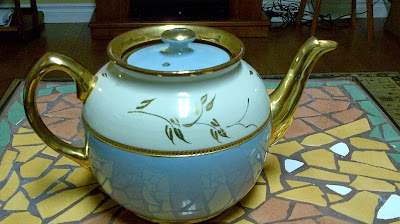 |
| Tea, anyone? |
It's inevitable. If you eat 1,000 more
calories than your body needs every day, you will gain weight. If you
drop a plate on the driveway, it will break.
British Historian, Lord Acton
(1834-1902) famously said, "Power tends to corrupt, and absolute
power corrupts absolutely. Great men are almost always bad men."
I imagine most of us would take exception to the last part, at least
if it comes without a definition of “great.” Furthermore, women
should take exception to the inference that only men can be
corrupted by power. Chauvinist!
Emperors and kings, dictators and
oligarchies don't figure much in our world, at least not in the West.
But through the ballot box or by
appointment we bestow the burden—or privilege—of power on all
kinds of people and too often what I call the Acton
effect reveals itself rather
quickly.
Mike Duffy, Pamela Wallin, Allison Redford come easily to
mind, and now Brad Wall is being charged by the opposition with
spending taxpayers' dollars frivolously by sending emissaries ahead
on trade missions to arrange his meals, accommodation, etc. This runs
into a whack of money when the mission is to Asia. (The option of
using travel agencies comes to mind.)
We've
been watching episodes of Wolf Hall
on PBS periodically. It's centered on the court intrigue during the
reign of Henry VIII; the manipulations and compromises of Thomas
Cromwell in service of the king and the exercise of monarchial privilege
wielded by Henry make for fascinating studies of the Acton
effect in an earlier time.
Meanwhile,
I'm also reading Cleopatra
by Stacy Schiff, a biography that takes us back into the century
before Christ. Cleopatra inherited the throne at 18, conjointly with
her 10 year-old brother (to whom she was also married for a time) and
grew up in a family where members murdered one another in order to
achieve and hold power. Yikes!
Kings
and dictators historically have assumed a privileged morality: kings
do whatever they want—whose to stop them? Furthermore, in order to
preserve the kingdom the ruler must exercise his power. He has to be,
and be seen to be, leader and protector of his subjects.
But
that hardly explains Mike Duffy's finding ways to charge even his
personal trainer's fees to the public purse. Many of us find
ourselves entitled to expense accounts from time to time. Work on
committees, appointment to leadership positions require that the
personal costs we incur in order to carry out our responsibilities
are reimbursed.
The temptation to be overly generous to ourselves is
real, particularly because it's an honour system in part and cheating
is easy. It is, nevertheless, theft, hardly distinguishable from shop
lifting . . . ethically, morally. It's also easily justified
under the rubric of “I work hard and long for this (company,
committee, institution), they owe me.”
I can also hear Mike Duffy say in his defense, “To do my job, I have to be fit; ergo, the personal
trainer cost is really my employers' (taxpayers') expense.” (Politicians also need orange juice to do their job, even when it's $16.00 a pop!)
We generally shorten Lord Acton's
pronouncement to “Power corrupts; absolute power corrupts
absolutely.” Maybe it's too cynical by half. I've known a lot of
hard-working board members in charitable organizations who donate not
only their time and work as well as their personal expenses to the
cause they're supporting through their participation.
Corruption is not
inevitable, not like overeating that leads to obesity.
But when politicians of any stripe
confuse their status with people like Henry VIII or Cleopatra, we have good
reason to protest.
Corruption has no legitimate place in a democracy.













.jpg)